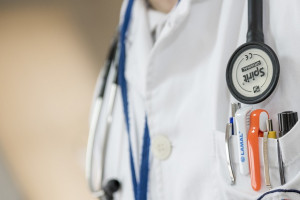
Cancer patients have often organized support and informational groups around their disease types.
Now a presentation at the American Association for Cancer Research (AACR) Annual Meeting 2018 describes the first research-focused group of patients organized around the genetic mutation that creates their cancer, namely changes to the gene ROS1.
While "ROS1 fusion" has primarily been studied in lung cancer, the Global ROS1 Initiative includes ROS1-positive (ROS1 ) patients with melanoma and pancreatic cancer as well.
And in addition to offering information and support, the group is helping to drive the direction of research aimed at cancers caused by this gene.
"We talked with researchers and we heard that one thing holding back research was lack of ROS1 cancer models that researchers could use for experiments," says Janet Freeman-Daily. As patient advocate at the University of Colorado Cancer Center Lung Cancer Specialized Program of Research Excellence (SPORE), Freeman-Daily spoke with Robert C. Doebele, MD, PhD, CU Lung SPORE PI and Director of CU Cancer Center Thoracic Oncology Research Initiative, and in partnership, CU, the Global ROS1 Initiative and the Bonnie J. Addario Lung Cancer Foundation created a program in which patients could donate cancer tissue for use in establishing cell lines.
"We have already received four remote tumour samples and generated two new ROS1 cell lines from patients who never even had to travel to University of Colorado," says Doebele.
Members of the Global ROS1 Initiative have also been involved in an epidemiological survey with the goal of better understanding patient characteristics associated with ROS1 cancers.
Results of this survey will be presented at AACR.
Another project has surveyed the group to discover the percentage of ROS1 patients who have experienced brain metastases.
An ongoing project hopes to discover if the sequence of treatments used against ROS1 cancer impacts outcomes.
"We have a larger number of patients in our group than on any single clinical trial, so we hope this will be an opportunity for researchers to learn about us and a way for us to learn more about our condition. We're working with clinicians and researchers to figure out how our group can best accelerate research," Freeman-Daily says.
The group represents a trend in oncology to move away from defining cancer by the site where it occurs and toward defining cancer by the genetic changes that create it.
Following the model of the Global ROS1 Initiative are groups organized around ALK, EGFR and HER2, all of which have been found to cause multiple cancer types.
"This may be a more functional, precision medicine approach to certain types of cancer," says Robert. C. Doebele, MD, PhD. "More and more we're showing that cancers caused by ROS1 or many other genetic drivers may be treated with similar drugs no matter where the cancer lives in the body."
The group, which can be found at ROS1cancers.com says Freeman-Daily, includes over 200 ROS1 patients across 20 countries.
"We provide support and education for each other, help find treatments and clinical trials, and talk about side effects. And we bring information we learn from our doctors back to the group," Freeman-Daily says.
Eventually, this innovative model may also bring treatments to the group that would otherwise have been impossible.
Source: University of Colorado
The World Cancer Declaration recognises that to make major reductions in premature deaths, innovative education and training opportunities for healthcare workers in all disciplines of cancer control need to improve significantly.
ecancer plays a critical part in improving access to education for medical professionals.
Every day we help doctors, nurses, patients and their advocates to further their knowledge and improve the quality of care. Please make a donation to support our ongoing work.
Thank you for your support.